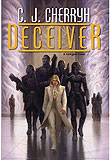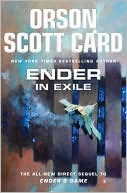
Deceiver, by C. J. Cherryh
Book Review by Edward F. McKeown
Have you read this book?
CJ Cherryh is the premier writer of what I think of as statecraft science-fiction. This is the stuff that occurs before the bullets start to fly that determines when they fly, how many of them fly and who they are aimed at. It's what goes on before Seal Team Six is dispatched, though we do get to see some of the running and gunning, particularly when things go wrong or as John F Kennedy used to say, Some dumb s.o.b doesn't get the word.
Deceiver is the 11th book of the Foreigner series that details the fate of a human colony after their ship becomes lost after a hyperspace jump. This isn't the homogenous crew of the Enterprise but a divided crew that further divides when colonists seek to escape the grim life of the lost ship and the space station it created, literally parachuting to the world below. While the world is hospitable to human life, the local species the Atevi are less so. Not surprising, considering that humans literally tear the roof off their fairly stable high-medieval world.
Imagine the human colonists as Commodore Perry but with no backup, only the firepower at hand and divisions in their own forces and you have the situation. Conflict breaks out, more from misunderstanding than malice. The difference between how the species bond, humans with love and friendship, Atevi from man?chi, which seems a combination of 'imprinting' and the desire to be associate upward to a powerful leader in a form of herd instinct.
Fast forward through the centuries to the present day, Bren Cameron is the Paidhi, the chief diplomat and advisor to the Tabini, the essential shogun of the fractious aishidi'tat that governs much of the planet. Humans hold their own continent island of Mosphiera and the Atevi hold the rest of the world. This apartheid has been arranged to preserve the Atevi culture, or at least slow down the rate of change to something they can handle and prevent further conflict which the outnumbered humans could lose.
The Atevi are humanoid aliens, far larger (I have seen reference material advising between 8 and 10 feet) and stronger than humans, with black skin and golden eyes. The cover art by the superb Michael Whelan conveys them very well, which is a relief as certain other covers made them look like large, angry Rastafarians. My personal preference is for the cover of Invader, which shows a more beautiful Jago and well illustrates the size discrepancy between her and Bren Cameron. Bren on the Deceiver cover is also well done, grimly determined and sharply dressed.
But it is in the alien mind that CJ works her differences. Atevi have no word for, "friend" or one for love as a human understands it. They are fascinated by numerology, sometimes to the point of superstition and live wrapped in layers of decorum and devious diplomacy suitable for the imperial court of ancient Japan, which in many ways their society resembles.
Over the series of books, Bren Cameron, like many a colonial official, becomes more and more drawn in to the world of the Atevi, frankly going native. He eventually ceases to work for the human government taking up Atevi titles, but always working for peace and better relations between the parties, backing the human-oriented Tabini, over traditionalists or those eager to get their hands on human technology for their own ends.
Bren is engaging personality, intelligent, loyal to his friends, even when some of them do not understand the word. In fact his loyalty downward to his guards is in their view a mild form of insanity, as their loyalties run primarily upwards in manichi. But Bren's most likeable characteristic is that while in no means a warrior, he is often first in the charge and last in the retreat. Even if the charge is in the form of a diplomatic discussion, he is always personally on the line.
Bren is the focus, originally because he controls the flow of technology, but later through his relationships with the powers of the world: Tabini, his grandmother Ilisidi (a combination of Lucretia Borgia and Eleanor of Aquitaine) a host of other nobles and Tabini's son Cajeiri, the most accessible of the Atevi characters, a precocious preteen.
Bren is kept alive in these struggles by his bodyguards from the Assassin's Guild: Banichi and his daughter Jago, an infuriatingly impenetrable character who becomes Bren's lover.
This cast of characters rolls through civil war, insurrection, assassination, the reappearance of the starship, the debut of the aetvie into space, the debut of new aliens, a coup and more plots than Game of Thrones on crack.
Holding onto your chair yet? Good, all of this happened before Deceiver opens. Therein lies one issue for the reader. Do not start reading this series with this book. Past a point in a series, especially if you are CJ Cherryh, you simply stop making each book its own complete tale because otherwise your prologue would essentially be a college course. That's less of a joke with CJ then you might think. Don't read these books when you are tired, or as a Twinkie. This is steak and taters with a Syrah to wash it down. Be sharp and pay attention.
A reader looking for action may find CJ's work a little off-putting. There is a decorous pace to these books, especially Deceiver. Things like the colors of the new bus for the estate assume an importance that some readers might find trying, but like the English 'plays of manners' things are done just so in the Atevi world. Displays of wit and political acumen dominate. Shots are fired when you miss a point and are revealed as stupid, or out of the loop.
This world has less wars, or what humans would recognize as wars, than does our world. Battles are usually fought between differing sections of the Assassin's Guild. Everyone has them and they stay loyal (usually) to the party they are attached to. So war on this world is more a struggle of elite security forces than what we are used to.
Still, I find the actual military struggles vague as to detail and confusing. Even when actual battle breaks out and, as happens a number of times, Bren and his companions are caught in it, it's sometimes hard to figure out what is happening. I understand that these are not Dickson's Dorsai, nor "Hammers Slammers" yet sometimes it would be nice to get some level of detail. Two cruisers of TF 58 pummeled a costal defense battleship, the 1st of the 72nd's tank destroyers cleared enemy armor off the road block, for example, but such is not to be. The combats are scuffles of cracked shots from unseen enemies with little information on the forces, arms and tactics. This is a book on grand strategy.
So while we get the details of how households work, and why it was important that someone didn't indicate in their periodic reports that members of a certain clan were seen in a certain household, action is sparse.
Young Cajeiri is a very useful device for explaining the Atevi to us. He has been raised on the voyaging starship for a considerable period, to preserve him from the convulsions of the coup against his father. The child is learning to be an Atevi under the tutelage of his traditional-minded grandmother Ilsidii. But the humans and the ships and gadgets fascinated him and he quickly establishes foothold in worlds, human and Atevi. Like most young people he wonders why they world is the way it is, allowing the author to explain without making it feel like an info dump.
Another area I would have liked to have seen developed is the relationship between Bren and Jago his eight foot and better bodyguard. It's a little like having one of the warrior elf-queens fall for a hobbit I suppose. She admires him for his intelligence and courage and develops a manichi for him, which is to say the functional equivalent of love; for all that they often do not understand each other. Once, in a prior book, she slaps him because he tried to lead enemy forces away from his household staff. For a human, this is personal merit in self-sacrifice, the mutuality of led and leader (to be a king in Narnia is to be first in the charge, last in the retreat) to an aetevi, this is insanity. Atevi run toward their leader when in danger and they do not expose their leader for anything, no more than samurai would.
There are not enough scenes between these two for me and I wanted to see more of WHY they are together. It's not mere sexual attraction, especially on her part. Something deeper operates, but I never feel that I get more than a glimpse of it, nor do I understand its depths or limitations. Tabini gifted Jago and her father's services to Bren. What happens to her if Bren turns on Tabini or Tabini on him? At what point does species loyalty come up for her, or does it at all? I would understand the subtext of a human relationship (think of the scene in Wall Street when Darryl Hannah bails on Marty Sheen. He is no longer a player; she is the woman of a player, so she is no longer his, regardless of what came before.) However between Bren and Jago the subtext is indecipherable.
Deceiver culminates in sudden move by Bren and his small team of guards to move into the home of the Deceiver, Pairuti, a rather muted villain who has been manipulating events and destabilizing the local and nation governments with his machinations. There is a brief blaze of action that determines the outcome. But was the Deceiver the puppet-master, or just another puppet? Stay tuned for Betrayer....
If Deceiver has a fault it's that like most middle books, it's the road and not the destination and it very much feels that way. Interesting though the journey is and however amicable the company, you do sort of feel that it ends with less fanfare than one would hope. Pairuti seems a pallid villain for all that he almost ends Cameron's career in the final pages. This is in part because as we only have Cameron and Cajeiri's viewpoints, we see very little of what is going on, having to think our way through what we hear. Often the principals do not meet, or even communicate. Compare that with the earlier Downbelow Station with its multiple viewpoints set close to the prime movers of the drama and one can occasionally wish we had access to a few more heads.
In sum, if you like CJ Cherryh's dense, political, plays of manners, you will jump at the change in Deceiver to spend more time with these Bren, Jago and Ilsidii, even if you sometimes don't feel that you know some of them any better than when you first met them. It's is a milieu story where the layers of relationships are the milieu and who owns what old house or even apartment tells you who will fight where for what. Admire the machinations and the manipulations. Try to see the next move as if you were Hercule Poirot in an alien world. Expect to work and to think.
These are not the easiest reads, but I think you will find a satisfaction at the end, similar to that found in reading Clavell's Shogun, when you realize that the prime mover in the whole book was Mariko. You spent the whole time watching and you didn't realize it till near the end that everyone was dancing to her tune. Same thing here, watch for the puppeteer.
Deceiver is the 11th book of the Foreigner series that details the fate of a human colony after their ship becomes lost after a hyperspace jump. This isn't the homogenous crew of the Enterprise but a divided crew that further divides when colonists seek to escape the grim life of the lost ship and the space station it created, literally parachuting to the world below. While the world is hospitable to human life, the local species the Atevi are less so. Not surprising, considering that humans literally tear the roof off their fairly stable high-medieval world.
Imagine the human colonists as Commodore Perry but with no backup, only the firepower at hand and divisions in their own forces and you have the situation. Conflict breaks out, more from misunderstanding than malice. The difference between how the species bond, humans with love and friendship, Atevi from man?chi, which seems a combination of 'imprinting' and the desire to be associate upward to a powerful leader in a form of herd instinct.
Fast forward through the centuries to the present day, Bren Cameron is the Paidhi, the chief diplomat and advisor to the Tabini, the essential shogun of the fractious aishidi'tat that governs much of the planet. Humans hold their own continent island of Mosphiera and the Atevi hold the rest of the world. This apartheid has been arranged to preserve the Atevi culture, or at least slow down the rate of change to something they can handle and prevent further conflict which the outnumbered humans could lose.
The Atevi are humanoid aliens, far larger (I have seen reference material advising between 8 and 10 feet) and stronger than humans, with black skin and golden eyes. The cover art by the superb Michael Whelan conveys them very well, which is a relief as certain other covers made them look like large, angry Rastafarians. My personal preference is for the cover of Invader, which shows a more beautiful Jago and well illustrates the size discrepancy between her and Bren Cameron. Bren on the Deceiver cover is also well done, grimly determined and sharply dressed.
But it is in the alien mind that CJ works her differences. Atevi have no word for, "friend" or one for love as a human understands it. They are fascinated by numerology, sometimes to the point of superstition and live wrapped in layers of decorum and devious diplomacy suitable for the imperial court of ancient Japan, which in many ways their society resembles.
Over the series of books, Bren Cameron, like many a colonial official, becomes more and more drawn in to the world of the Atevi, frankly going native. He eventually ceases to work for the human government taking up Atevi titles, but always working for peace and better relations between the parties, backing the human-oriented Tabini, over traditionalists or those eager to get their hands on human technology for their own ends.
Bren is engaging personality, intelligent, loyal to his friends, even when some of them do not understand the word. In fact his loyalty downward to his guards is in their view a mild form of insanity, as their loyalties run primarily upwards in manichi. But Bren's most likeable characteristic is that while in no means a warrior, he is often first in the charge and last in the retreat. Even if the charge is in the form of a diplomatic discussion, he is always personally on the line.
Bren is the focus, originally because he controls the flow of technology, but later through his relationships with the powers of the world: Tabini, his grandmother Ilisidi (a combination of Lucretia Borgia and Eleanor of Aquitaine) a host of other nobles and Tabini's son Cajeiri, the most accessible of the Atevi characters, a precocious preteen.
Bren is kept alive in these struggles by his bodyguards from the Assassin's Guild: Banichi and his daughter Jago, an infuriatingly impenetrable character who becomes Bren's lover.
This cast of characters rolls through civil war, insurrection, assassination, the reappearance of the starship, the debut of the aetvie into space, the debut of new aliens, a coup and more plots than Game of Thrones on crack.
Holding onto your chair yet? Good, all of this happened before Deceiver opens. Therein lies one issue for the reader. Do not start reading this series with this book. Past a point in a series, especially if you are CJ Cherryh, you simply stop making each book its own complete tale because otherwise your prologue would essentially be a college course. That's less of a joke with CJ then you might think. Don't read these books when you are tired, or as a Twinkie. This is steak and taters with a Syrah to wash it down. Be sharp and pay attention.
A reader looking for action may find CJ's work a little off-putting. There is a decorous pace to these books, especially Deceiver. Things like the colors of the new bus for the estate assume an importance that some readers might find trying, but like the English 'plays of manners' things are done just so in the Atevi world. Displays of wit and political acumen dominate. Shots are fired when you miss a point and are revealed as stupid, or out of the loop.
This world has less wars, or what humans would recognize as wars, than does our world. Battles are usually fought between differing sections of the Assassin's Guild. Everyone has them and they stay loyal (usually) to the party they are attached to. So war on this world is more a struggle of elite security forces than what we are used to.
Still, I find the actual military struggles vague as to detail and confusing. Even when actual battle breaks out and, as happens a number of times, Bren and his companions are caught in it, it's sometimes hard to figure out what is happening. I understand that these are not Dickson's Dorsai, nor "Hammers Slammers" yet sometimes it would be nice to get some level of detail. Two cruisers of TF 58 pummeled a costal defense battleship, the 1st of the 72nd's tank destroyers cleared enemy armor off the road block, for example, but such is not to be. The combats are scuffles of cracked shots from unseen enemies with little information on the forces, arms and tactics. This is a book on grand strategy.
So while we get the details of how households work, and why it was important that someone didn't indicate in their periodic reports that members of a certain clan were seen in a certain household, action is sparse.
Young Cajeiri is a very useful device for explaining the Atevi to us. He has been raised on the voyaging starship for a considerable period, to preserve him from the convulsions of the coup against his father. The child is learning to be an Atevi under the tutelage of his traditional-minded grandmother Ilsidii. But the humans and the ships and gadgets fascinated him and he quickly establishes foothold in worlds, human and Atevi. Like most young people he wonders why they world is the way it is, allowing the author to explain without making it feel like an info dump.
Another area I would have liked to have seen developed is the relationship between Bren and Jago his eight foot and better bodyguard. It's a little like having one of the warrior elf-queens fall for a hobbit I suppose. She admires him for his intelligence and courage and develops a manichi for him, which is to say the functional equivalent of love; for all that they often do not understand each other. Once, in a prior book, she slaps him because he tried to lead enemy forces away from his household staff. For a human, this is personal merit in self-sacrifice, the mutuality of led and leader (to be a king in Narnia is to be first in the charge, last in the retreat) to an aetevi, this is insanity. Atevi run toward their leader when in danger and they do not expose their leader for anything, no more than samurai would.
There are not enough scenes between these two for me and I wanted to see more of WHY they are together. It's not mere sexual attraction, especially on her part. Something deeper operates, but I never feel that I get more than a glimpse of it, nor do I understand its depths or limitations. Tabini gifted Jago and her father's services to Bren. What happens to her if Bren turns on Tabini or Tabini on him? At what point does species loyalty come up for her, or does it at all? I would understand the subtext of a human relationship (think of the scene in Wall Street when Darryl Hannah bails on Marty Sheen. He is no longer a player; she is the woman of a player, so she is no longer his, regardless of what came before.) However between Bren and Jago the subtext is indecipherable.
Deceiver culminates in sudden move by Bren and his small team of guards to move into the home of the Deceiver, Pairuti, a rather muted villain who has been manipulating events and destabilizing the local and nation governments with his machinations. There is a brief blaze of action that determines the outcome. But was the Deceiver the puppet-master, or just another puppet? Stay tuned for Betrayer....
If Deceiver has a fault it's that like most middle books, it's the road and not the destination and it very much feels that way. Interesting though the journey is and however amicable the company, you do sort of feel that it ends with less fanfare than one would hope. Pairuti seems a pallid villain for all that he almost ends Cameron's career in the final pages. This is in part because as we only have Cameron and Cajeiri's viewpoints, we see very little of what is going on, having to think our way through what we hear. Often the principals do not meet, or even communicate. Compare that with the earlier Downbelow Station with its multiple viewpoints set close to the prime movers of the drama and one can occasionally wish we had access to a few more heads.
In sum, if you like CJ Cherryh's dense, political, plays of manners, you will jump at the change in Deceiver to spend more time with these Bren, Jago and Ilsidii, even if you sometimes don't feel that you know some of them any better than when you first met them. It's is a milieu story where the layers of relationships are the milieu and who owns what old house or even apartment tells you who will fight where for what. Admire the machinations and the manipulations. Try to see the next move as if you were Hercule Poirot in an alien world. Expect to work and to think.
These are not the easiest reads, but I think you will find a satisfaction at the end, similar to that found in reading Clavell's Shogun, when you realize that the prime mover in the whole book was Mariko. You spent the whole time watching and you didn't realize it till near the end that everyone was dancing to her tune. Same thing here, watch for the puppeteer.
|
Click here to buy Deceiver, by C. J. Cherryh on Amazon
|
Deceiver, by C. J. Cherryh on Amazon

| More Books You Might Like |
Comment on Deceiver, by C. J. Cherryh
| Comments on Deceiver, by C. J. Cherryh |
| There are no comments on this book. |



